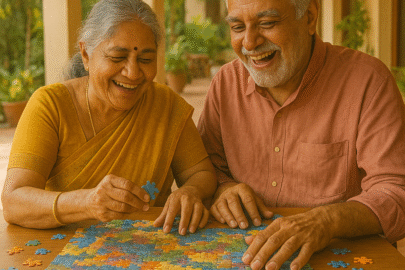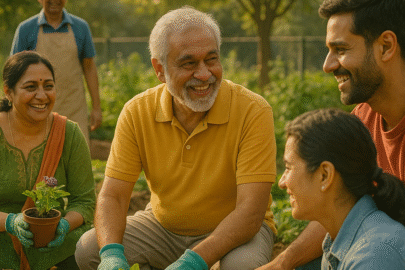
Ask any group of seniors at a cards table in Mumbai, or a group of morning walkers in Bangalore, and you’ll hear a version of the same thing: “We come for the activity, but we stay for each other.”
Science backs this up. A large study found that seniors who played cards almost every day were 37% less likely to develop dementia compared to those who didn’t. This is the difference between keeping independence well into your 80s versus struggling with simple daily tasks.
But the numbers only tell half the story.
Take Mrs. Suresh, 72, from Pune. After her husband passed away, her daughter nudged her to join the neighbourhood “kitty club.” At first, she went reluctantly, unsure if she would fit in. Today, she hosts one of the most popular monthly sessions. “I thought it would be just cards with a side of chai and samosas,” she laughs, “but I’ve found sisters here. We remind each other to take our medicines, to get our check-ups done, and to keep going when life feels heavy.”
Or consider Mr. Mehta, 68, a retired bank officer in Delhi. His group of bridge friends started playing to keep their minds sharp, but now the games have turned into long evenings of tea, teasing, and laughter. “If I miss two weeks,” he says, “they come knocking on my door.”
These little circles become lifelines. They reduce stress, keep minds alert, and give people something to look forward to. With a little creativity, you can weave connections into your everyday life in simple, sustainable ways.
Putting It Into Practice: Small Steps, Big Impact
When we talk about activities for seniors in India, the most effective ones are those that mix light movement, mental stimulation, and companionship.
1. Start or Join a Games Circle
Don’t just shuffle the same cards every time—mix it up. A rummy night this month, carrom or Scrabble the next. Rotating games keeps the brain challenged and conversations fresh.
The Mahjong Effect: Play Your Way to Brain Health
If you thought mahjong was only for crowded tea houses in Hong Kong or Shanghai, think again. In recent years, the game has quietly found a fan base among Indian seniors—especially in Mumbai, Delhi, and Bengaluru. Beginner-friendly mahjong tables are popping up in clubs, housing societies, and even in online gaming rooms.
Why the craze? What makes mahjong for seniors in India so appealing is that it blends the joy of companionship with a proven boost for mental agility.
A 10-year study showed that mahjong players maintained their memory and had better reaction times and focus. Evidence on mahjong brain health points to gains in attention, working memory, and processing speed with regular play. Importantly, researchers found the effect was one-way: the more people played, the better their brains performed later.
Mrs. Nair, 67, a retired banker in Bengaluru, describes her weekly sessions: “We start with the tiles, but soon we’re talking about recipes, politics, and grandchildren. I laugh more in those three hours than the whole week.”
So if you’re looking for one activity that blends mental agility, social bonding, and sheer fun, mahjong for Indian seniors may be worth a try. And unlike a crossword puzzle or Sudoku, it comes with the bonus of friends around the table.
Pro tip: Create a rotating host system so no one feels the burden of arranging every meet.
2. Make Walking a Social Ritual
Morning and evening walkers already fill the parks, but what makes it last is adding a twist. Your group can set a “theme of the week” from poetry recitals to sharing old film songs after the walk. The movement becomes the excuse; the storytelling is the real draw.
Pro tip: End with a simple chai break at a local stall—something to look forward to.
3. Explore Hobby Circles—Offline or Online
Think beyond cards: gardening clubs that exchange cuttings or photography walks with fellow retirees. For those who prefer the digital route, even something as simple as following a podcast, joining a WhatsApp interest group, or watching a YouTube series together can spark conversations and create a shared sense of community.
Pro tip: Pick a hobby where you’re a beginner, not an expert. It keeps curiosity alive and encourages genuine bonding.
4. Stay Intergenerational
Grandparents are teaching chess, and grandchildren are teaching Instagram reels. This swap is a win-win for both parties. Think of a housing society that runs a “Saturday Swap,” where elders teach traditional recipes while teens give a 30-minute “tech demo” (WhatsApp hacks, digital payments).
Pro tip: Keep it informal—no lectures—just shared time, where skills transfer flows naturally.
5. Treat Companionship Like Health Care
We often keep doctors’ appointments sacred but let social plans slide. Flip that thinking: see your monthly kitty, daily laughter club meet, or Friday bridge game as a non-negotiable dose of health. Put it in your calendar, block the time, and treat it with the same seriousness as medication.
Pro tip: If you miss a session, reschedule, don’t cancel. Continuity is where the benefit lies.
Beyond the Brain: How Connection Strengthens the Whole Body
We often think of friendships as “good for the heart” in an emotional sense. However, research shows that companionship also protects the heart, immune system, and even longevity itself.
A growing body of evidence on senior health in India highlights not just medical care but the daily role of companionship in preventing illness.
- Heart health: A large study found that older adults with strong social networks had a 29% lower risk of coronary heart disease compared to those who were socially isolated. Stress hormones drop when we laugh, talk, and share, directly lowering blood pressure and heart strain.
- Immunity boost: Research showed that socially isolated adults had weaker antiviral immune responses.
- Living longer: The famous Harvard Study of Adult Development—now over 80 years old—proves that close relationships are the strongest predictor of long, healthy lives. More than diet, wealth, or exercise alone, connection keeps people thriving into their 80s and 90s.
This is more than theory for Mr. Deshpande, 74, who had bypass surgery two years ago. His evening walking group became his accountability partners. “Some days I wanted to skip, but they rang my bell and dragged me out,” he says. “Today I can walk 5 km without breathlessness. Without them, I’d have stayed on the sofa.”
In India’s joint families and close-knit communities, the power of social connection and longevity has long been visible in elders who stay active in festivals and gatherings.
The takeaway still holds true. Connection isn’t just good for the mind—it’s medicine for the body.
With so much evidence in its favour, the simplest answer to senior health may be to treat social connection like a daily vitamin—something small, regular, and non-negotiable.
Social Health Checklist: Staying Active in India
✅ Do I have at least one regular group activity each week that I look forward to?
✅ Do I spend time connecting with family across generations in a way that feels meaningful?
✅ Do I use at least one way to stay connected beyond my immediate circle—whether in person, on the phone, or online?
If you can tick all three, you’re already building a strong foundation for better mood, memory, and long-term health. If not, start with one, and let it grow naturally.
Frequently Asked Questions
1. Can games like mahjong really help prevent dementia?
While no single activity can guarantee dementia prevention, long-term studies show that frequent mahjong players maintain better memory, attention, and reaction time compared to non-players. The combination of strategy, social interaction, and regular play makes it especially powerful for brain health.
2. Why is social connection important for senior health in India?
In India, seniors often live within rich community networks—housing societies, religious groups, or neighbourhood clubs. Research shows these bonds reduce stress, lower the risk of heart disease, and improve recovery after illness. In short, staying connected protects both mind and body.
3. How often should seniors join group activities?
There’s no strict rule, but consistency matters more than intensity. The best answer to how seniors can stay socially active is to treat connection as part of your weekly routine, not an occasional event. Even one or two group activities per week can boost mood and memory. What counts is finding a rhythm that feels enjoyable and sustainable.
4. What are the simple first steps for seniors who feel shy or new to groups?
Start small: join a neighbour for a walk, attend a community event, or try an online class from home. Low-pressure settings make it easier to build comfort and gradually expand your circle.





